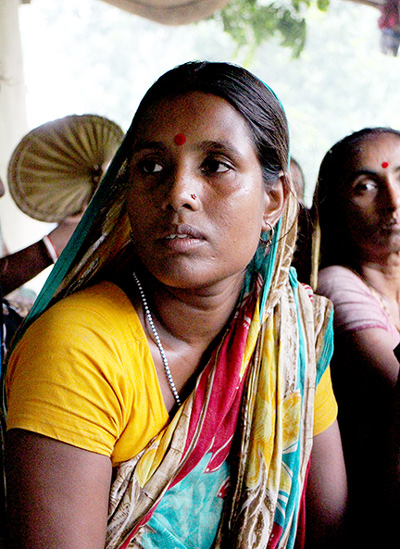How women find work after climate change disasters
Date:
Author: Amy Reggers
When Cyclone Aila hit Bangladesh in 2009, Promila and her family were some of the many thousands left struggling in its aftermath. Twenty-six year old Promila, her husband, and two young girls, usually dependent on subsistence agriculture and small-scale homestead gardening, now had to find other ways to survive.

Cyclone Aila was only one of the major climate events that has affected the south-western coastal areas of Satkhira Bangladesh. In recent years, storm surges, salinity intrusion and coastal erosion have become common, and the coastal belt has been identified as a problem area due to different climatic disasters, complex hydro-geological conditions, and adverse water quality, which make safe water supply difficult. It is one of the most hazard-prone, hard-to-reach areas in Bangladesh.
The cyclone left Promila’s husband, Shangjoy, out of work as a labourer and agricultural worker. After receiving advice from neighbours, Promila and Shangjoy agreed he would move to Dhaka to work as a rickshaw-puller. He migrates for 15-20 days at a time, and then returns to his family to rest. If he is well enough, he picks up some day laboring work where he can, depending on the season. Shangjoy sends money home to Promila to help her pay for food, education and healthcare.
With her husband gone, Promila’s life has changed. Although Promila and her husband talk every day; he pays for a mobile phone for her and himself so they can communicate and make decisions together, she is otherwise isolated. Her parents, brother, and sister moved across the border to India to find new livelihoods in West Bengal. While Promila has her in laws nearby, she feels a greater sense of responsibility for her family with her husband now gone and little family left in the area.
When Shangjoy first went to Dhaka, Promila was mostly reliant on him being able to send money back to the family. But Promila was also advised by her husband to take loans from family members or other community members when he couldn’t send money home. Promila feels tense when she asks for a loan, and has a heavy sense of responsibility to repay the loans. She also has one 15,000 taka loan with a NGO, which she must repay in 350 taka a month installments. She often can’t make the repayments so she decided she needed to find some work to help pay the loans and feed the family. ‘I don’t want to only depend on my husband,’ she said.
In April this year, during the rice season harvest, she took up a job as a day labourer for 15-20 days in a neighboring village harvesting rice. Her eldest daughter didn’t need care and her neighbors looked after her younger daughter while Promila went to work. The job paid 70 taka per day for work from 7am – 1pm. But it meant she had to rise early, prepare the food for the day, tend to the children, and leave for the 90-minute walk to the neighbouring village to begin at 7am. However, the opportunity to earn an income was welcomed when Promila needed money to pay for her youngest daughter’s medical treatment. She didn’t have to wait until her husband could send money, she was able to pay for this treatment from the money earned from her work. However, the opportunities for women to work in this area are very limited, and Promila is in need of more stable employment and income.
Promila’s dream is to have her daughters educated, ‘so they can work and become good women’. Her eldest daughter wants to become a teacher and Promila hopes to be able to make that dream a reality. While climate-induced migration means Promila and her husband and many families in the South West are separated, an increase in women’s participation in the labor market can be seen. UN Women Bangladesh recognizes the need for opportunities for women, like Promila, in the workforce particularly in areas where there is significant male outward migration and women are left to find employment in the face of changing agricultural patterns and labor patterns.
UN Women Bangladesh is researching the effects of climate-induced migration to better understand this phenomena, as part of its project in Reducing Vulnerability of Women Affected by Climate Change through Viable Livelihood Options, kindly supported by the Royal Norwegian Embassy. Knowing how Promila and Shangjoy have coped, and what challenges women face in areas severely affected by climate change and migration patterns is key to establishing a rights-based approach to addressing the gender equality dimensions of climate change and disasters.